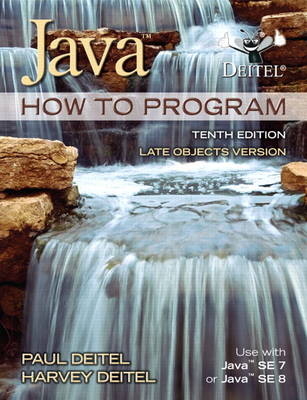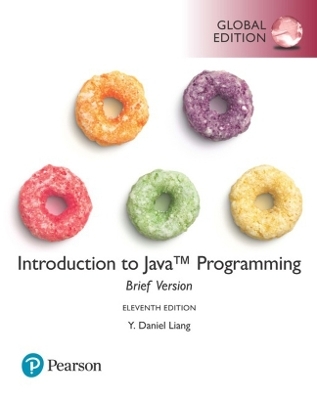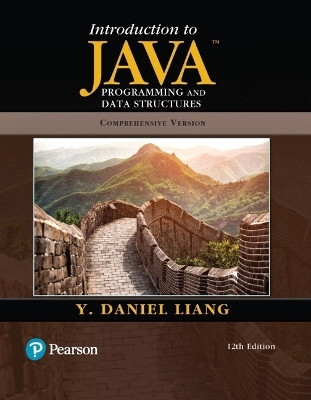
Java How To Program (late objects)
Pearson
978-0-13-257565-2 (ISBN)
- Titel erscheint in neuer Auflage
- Artikel merken
Paul J. Deitel, CEO and Chief Technical Officer of Deitel & Associates, Inc., is a graduate of MIT's Sloan School of Management, where he studied Information Technology. He holds the Java Certified Programmer and Java Certified Developer certifications, and has been designated by Sun Microsystems as a Java Champion. Through Deitel & Associates, Inc., he has delivered Java, C, C++, C# and Visual Basic courses to industry clients, including IBM, Sun Microsystems, Dell, Lucent Technologies, Fidelity, NASA at the Kennedy Space Center, the National Severe Storm Laboratory, White Sands Missile Range, Rogue Wave Software, Boeing, Stratus, Cambridge Technology Partners, Open Environment Corporation, One Wave, Hyperion Software, Adra Systems, Entergy, CableData Systems, Nortel Networks, Puma, iRobot, Invensys and many more. He has also lectured on Java and C++ for the Boston Chapter of the Association for Computing Machinery. He and his father, Dr. Harvey M. Deitel, are the world's best-selling programming language textbook authors. Dr. Harvey M. Deitel, Chairman and Chief Strategy Officer of Deitel & Associates, Inc., has 45 years of academic and industry experience in the computer field. Dr. Deitel earned B.S. and M.S. degrees from the MIT and a Ph.D. from Boston University. He has 20 years of college teaching experience, including earning tenure and serving as the Chairman of the Computer Science Department at Boston College before founding Deitel & Associates, Inc., with his son, Paul J. Deitel. He and Paul are the co-authors of several dozen books and multimedia packages and they are writing many more. With translations published in Japanese, German, Russian, Spanish, Traditional Chinese, Simplified Chinese, Korean, French, Polish, Italian, Portuguese, Greek, Urdu and Turkish, the Deitels' texts have earned international recognition. Dr. Deitel has delivered hundreds of professional seminars to major corporations, academic institutions, government organizations and the military.
Print Book Chapters
Chapter 1, Introduction to Computers, the Internet and Java
Chapter 2, Introduction to Java Applications; Input/Output and Operators
Chapter 3, Control Statements: Part 1; Assignment, ++ and - Operators
Chapter 4, Control Statements: Part 2; Logical Operators
Chapter 5, Methods
Chapter 6, Arrays and ArrayLists
Chapter 7, Introduction to Classes and Objects
Chapter 8, Classes and Objects: A Deeper Look
Chapter 9, Object-Oriented Programming: Inheritance
Chapter 10, Object-Oriented Programming: Polymorphism and Interfaces
Chapter 11, Exception Handling: A Deeper Look
Chapter 12, GUI Components: Part 1
Chapter 13, Graphics and Java 2D
Chapter 14, Strings, Characters and Regular Expressions
Chapter 15, Files, Streams and Object Serialization
Chapter 16, Generic Collections
Chapter 17, Java SE 8 Lambdas and Streams
Chapter 18, Recursion
Chapter 19, Searching, Sorting and Big O
Chapter 20, Generic Classes and Methods
Chapter 21, Custom Generic Data Structures
Chapter 22, GUI Components: Part 2
Chapter 23, Concurrency
Chapter 24, Accessing Databases with JDBC
Chapter 25, JavaFX GUI: Part 1
Online Chapters
Chapter 26, JavaFX GUI: Part 2 (PSR-Per Software Release)
Chapter 27, JavaFX Graphics and Multimedia (PSR-Per Software Release)
Chapter 28, Networking
Chapter 29, Java Persistence Architecture (JPA)
Chapter 30, JavaServer (TM) Faces Web Apps: Part 1
Chapter 31, JavaServer (TM) Faces Web Apps: Part 2
Chapter 32, REST-Based Web Services
Chapter 33, ATM Case Study, Part 1: Object-Oriented Design with the UML
Chapter 34, ATM Case Study, Part 2: Implementing an Object-Oriented Design
Print Book Appendices
Appendix A, Operator Precedence Chart
Appendix B, ASCII Character Set
Appendix C, Keywords and Reserved Words
Appendix D, Primitive Types
Appendix E, Using the Debugger
Online Appendices
Appendix F, Using the Java API Documentation
Appendix G, Creating Documentation with javadoc
Appendix H, Unicode
Appendix I, Formatted Output
Appendix J, Number Systems
Appendix K, Bit Manipulation
Appendix L, Labeled break and continue Statements
Appendix M, UML 2: Additional Diagram Types
Appendix N, Design Patterns
| Erscheint lt. Verlag | 4.3.2014 |
|---|---|
| Sprache | englisch |
| Maße | 175 x 231 mm |
| Gewicht | 1746 g |
| Themenwelt | Informatik ► Programmiersprachen / -werkzeuge ► Java |
| Informatik ► Software Entwicklung ► Objektorientierung | |
| Mathematik / Informatik ► Informatik ► Web / Internet | |
| ISBN-10 | 0-13-257565-5 / 0132575655 |
| ISBN-13 | 978-0-13-257565-2 / 9780132575652 |
| Zustand | Neuware |
| Informationen gemäß Produktsicherheitsverordnung (GPSR) | |
| Haben Sie eine Frage zum Produkt? |
aus dem Bereich

